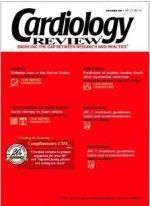Carvedilol slows renal dysfunction in systolic HF
TORONTO—Carvedilol appears to have renoprotective properties in patients with chronic systolic heart failure (CHF), as evidenced by increases in glomerular filtration rate (GFR), said Anil Verma, MD, at the 8th Annual Scientific Meeting of the Heart Failure Society of America.
“Patients with CHF and renal dysfunction have a worse prognosis and should be treated aggressively with medications that have a favorable risk/benefit ratio, such as carvedilol, which may inhibit a decline of renal function and improve morbidity and mortality,” said Dr. Verma, lead investigator of a study presented here, and attending physician at Candler Internal Medicine in Statesboro, Georgia.
Renal dysfunction is a common complication for patients with CHF, and is associated with a poorer prognosis in heart failure (HF) associated with left ventricular (LV) systolic dysfunction. In hypertensive animal models and humans, carvedilol has been shown to reduce urinary albumin excretion and expression of profibrotic factors such as renal tissue growth factor (TGF)-beta, suggesting that it may inhibit the decline in renal function in patients with CHF.
The changes in GFR over time were assessed in a study of 94 men and women with CHF defined by an LV ejection fraction of less than 45%. Forty-nine patients taking carvedilol and 45 not taking carvedilol were randomly selected from five physician practices to participate in the study. All patients were on standard HF therapies, with the initiation of carvedilol at the discretion of the treating physician. GFR was estimated at baseline and after a mean duration of 20 months in both users and nonusers of carvedilol.
There was no difference in GFR at baseline between the carvedilol users and nonusers. After a median follow-up of 20 months, the mean GFR in carvedilol recipients was 67.10 mL/min per 1.73 m2 and the mean GFR in the nonusers was 50.00 mL/min per 1.73 m2, for a mean average difference in GFR of 17.10 mL/min per 1.73 m2 (P = .011). The mean average GFR increased by 3.31 mL/min per 1.73 m2 in the carvedilol group and declined by 11.30 mL/min per 1.73 m2 in patients not taking carvedilol.
Of the patients who were not taking carvedilol, 69% had moderate chronic kidney disease at the end of the study, defined as GFR less than 60 mL/min per 1.73 m2, compared with 45% who were taking carvedilol, corresponding to a 35% reduction in relative risk with carvedilol use.
The improvement in GFR with carvedilol was independent of the improvement in LV ejection fraction, said Dr. Verma, which suggests that carvedilol is independently renoprotective. “The reason could be that carvedilol inhibits TGF and prevents fibrosis,” he said. “It also reduces albumin excretion in the kidney and has antioxidant properties.”
The alpha- and beta-blocking properties of carvedilol result in both intravascular and intrarenal blood pressure control, he added.
In determining the prognosis of a patient with HF, the GFR should be integrated with other prognostic factors, such as LV ejection fraction, patient functional status, serum sodium, and B-type natriuretic peptide levels, said Dr. Verma. “The take-home message is that by diagnosing and aggressively treating HF early, you can prevent much of the decline in renal function that is associated with chronic HF,” he said.
